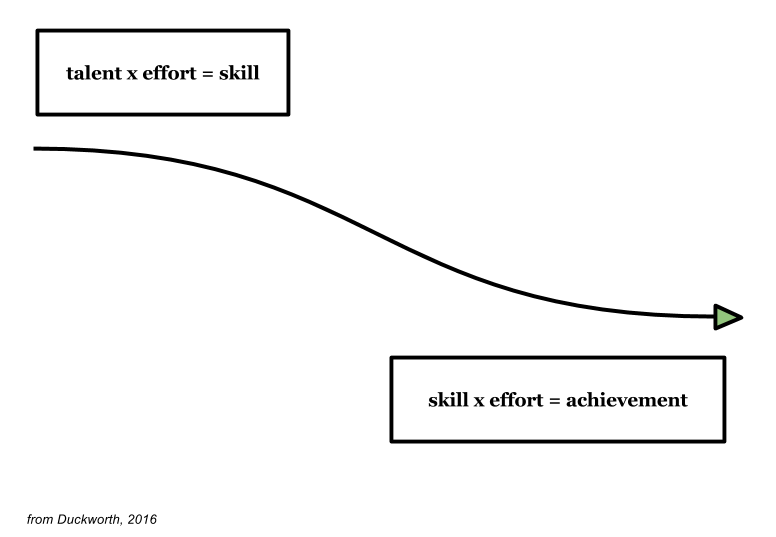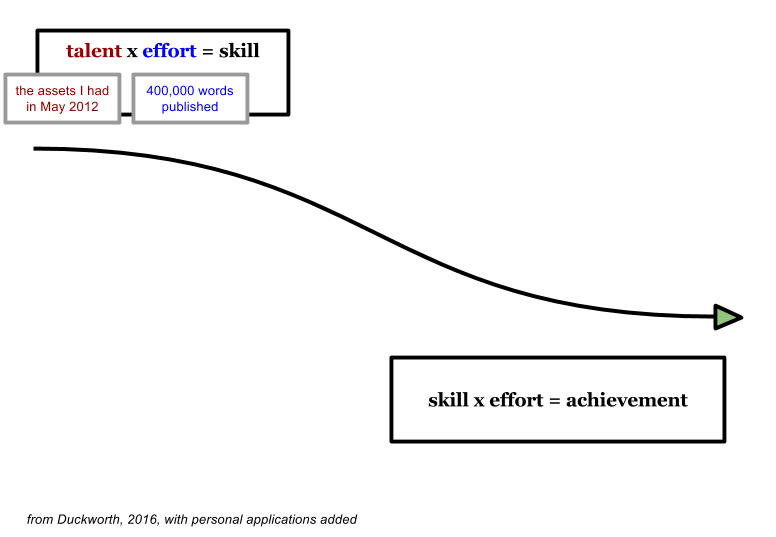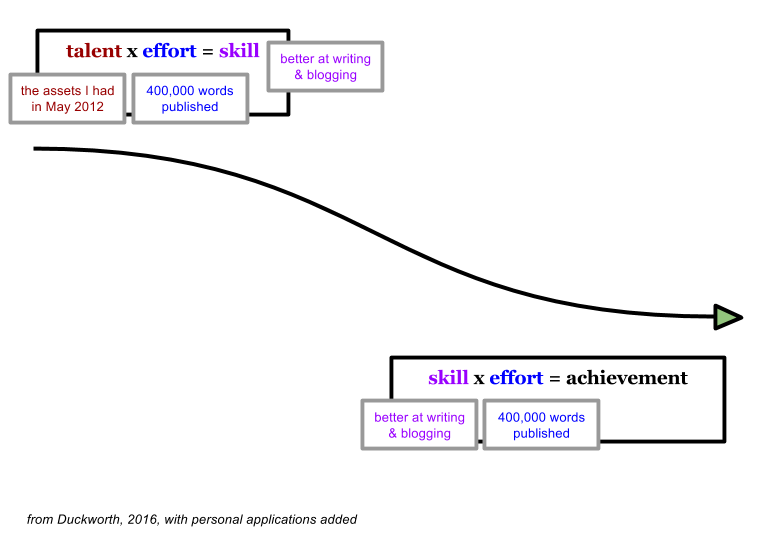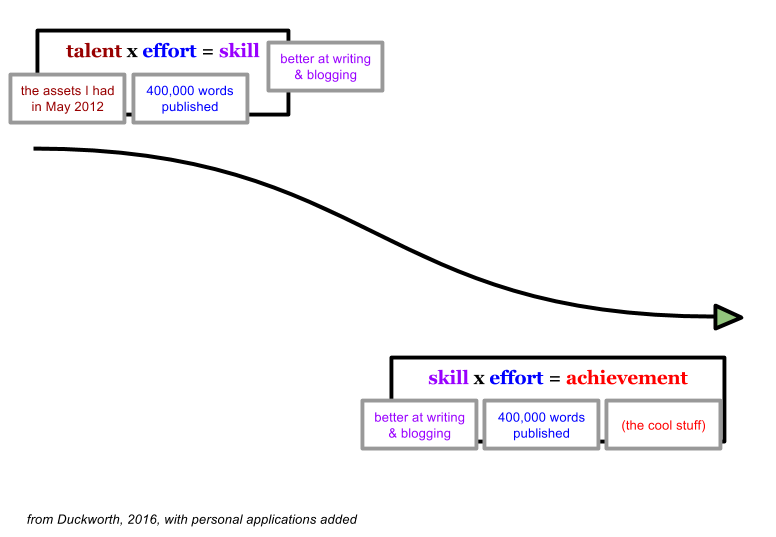Just over four years ago, I started this blog (here's what it looked like). I started by writing through the Common Core literacy standards, and my goals were to learn something, help decrease the freak-out, and (moonshot) publish a book one day. (That happened, with Jossey-Bass Wiley).
Fast forward to today. Blogging is one of the most rewarding things I do, right up there with husbanding, dadding, and teaching. So here's the question: What have these four years of blogging helped me see? What has it taught me?
A lot of things (I share a bunch in the free 5 Days to a Successful Blog email course — sorry for the cheesy title), but what I'd like to talk about today comes from something I read recently: effort counts twice.
“Effort counts twice.”
In her recent book, Angela Duckworth talks about the tired myth of “the natural.” Yes, it's true that the Mozarts and John Irvings and Michael Phelps of the world were likely born with some genetic advantages for music or writing or swimming (Duckworth uses “talent” as a shorthand for natural ability). But, Duckworth contends, natural talent does not automatically yield achievement.
Duckworth's theory is that talent multiplied by effort yields skill (for Mozart, the skill of composing music; for Phelps, the breast stroke), and that skill, multiplied by effort, yields achievement (for Mozart, let's say his famous Eine Kleine Nachtmusik; for Phelps, his gold medals). In other words, every effort counts two times, or in Duckworth's turn of phrase, “effort counts twice.” (See Figure 1).

Let's examine how this theory looks through the lens of the longest-running professional project of my life (outside of the project of becoming the teacher I want to be).
The talent part
I did come into blogging in May 2012 with pre-existing “talent.” I
- Had enjoyed writing since I was a kid and had done a lot of it growing up and as a young adult;
- Had great writing teachers throughout my K-12 education and into college [1];
- Had researched the ways in which a great blog can also be a great business (thereby creating a way to benefit my wife and daughters through blogging);
- Had basic experience with understanding how computers think (I enjoyed a computer science course in high school) and how WordPress works (I had some casual blogs in college and early on in my career).
These are just a few of the advantages I had. I'm also an introvert (important), my wife supported my early efforts (critical), I'm not a perfectionist (crucial), and surely a million other things. And these were things I brought with me to the first blog posts of May 2012.
The effort part
Yet what I brought to blogging at the outset wasn't going to produce a thing without being multiplied by effort. The best way to measure a blogger's effort, in my opinion, is in Words Published. (This is why I always advise aspiring bloggers to publish at least 100 blog posts before quitting.) Words Published represent some words you've hated writing, some words you've published only after solving the latest technical issue on your blog, some words you've gotten feedback on, some words that went out and were met with silence, and so on. (Note that Effort isn't just a mindless, “doing the time” kind of thing; this is why years of teaching experience aren't synonymous with years of teaching effort.)
So in the past four years, my Effort = 400,000 words (313,000 words on this blog + 50,000 words for my first book with Jossey-Bass + 37,000 words for other resources or publications). [2]
Which brings us to Figure 2.

The skill part
Here are some ways that I see improvements in my skill as a blogger now versus my skill as a blogger in May 2012.
- Stuff I wrote four years ago mortifies me more than stuff I wrote a year ago. (Progress!)
- My once infrequent posting schedule has been replaced by a consistent Tuesday and Saturday tempo (and breaks from the schedule are planned. More than a day in advance, too!). (See Figure 3.)
- Technical hold-ups are far less frequent. Nowadays, I typically know how to solve problems that arise or know where to go when I can't solve them myself.
In short, I'm better at producing writing and doing all the things a blogger does because of the effort put in (400,000 published words). And this is where it starts to get cool. (See Figure 4.)

The achievement part (AKA the cool stuff)
Here's the “secret” of anyone who has achieved something you admire: there comes a point where the hours of effort combined with effort-derived skill improvements start to produce achievement. First you reach one student each year, then you start reaching a few, and suddenly you're reaching many of them because the whole time you've been working at reaching students. Mozart wrote more than 600 pieces of music in his lifetime (perhaps his Effort metric would be Pieces Finished), and as a result several of these are enduringly recognizable and universally celebrated even today.
So what have the 400,000 words of the past four years of blogging produced? I think that depends on how I've defined achievement. From the very start, I had several kinds of goals.
I had a goal for impact: I wanted to promote the long-term flourishing of more students by helping their teachers with whatever I could offer. It was a vague goal that I'm working at refining this summer, but I'm so thankful to say that I sometimes get emails from readers saying that, indeed, X post or Y resource has helped them or encouraged them. (Psst… those emails are the best.) [3]
I had a “bucket list” goal: I wanted to publish a book traditionally. As I mentioned at the outset of this post, that happened. It's not a book that I think every teacher must have on their bookshelf, but it's one step closer to writing one that is.
I had an income goal: I wanted the blog to provide extra income for my family so that we could pay down debt and get financially free. I'm blessed with a wife who enjoys staying home with our daughters, and I wanted to bless her with added income for our family. Four years later, my work on the blog earns more than my work as a teacher.
I had a teaching goal: I hoped the “hard things” I was doing because of blogging would have positive repercussions in the classroom. They have. Some kids will randomly respect me because I'm a nerdy blogger or have written a very obscure book, and that respect sometimes persists even after I tell them that I am in fact a nerd and that my book is in fact very obscure. Respect is one kind of currency that teachers use every day.
And cool things have happened that I couldn't have even anticipated setting goals for, like dinner with long-time readers (Shawn Bally of Ohio, most recently) or epic cottage sharing with instant friends (Lisa Vahey) or memorable dining experiences along the shore of the Pacific Ocean (Jim Burke at the Cliff House). It's insane the kinds of things the 400,000 words of effort (and, in my fervent opinion, gracious providence) have made possible.
In short, I've learned the pretty obvious lesson that Duckworth's theory makes sense. Effort counts twice because as you're developing skill as a blogger you're also creating some blog posts that may lead to various forms of achievement. (See Figure 5.)

What's your next step?
I didn't write all this simply to add to my word count! Here are two questions for you to consider:
- First, where do you need to apply your teaching efforts in the year to come? If you've got the basics established (classroom management, time management, and other survival-level skills), then I'd recommend working at the components of the non-freaked out framework. Apply effort toward those five things; become an earnest student of them.
- Second, is there a long-term project outside of the classroom that might increase your impact inside of it? Blogging has been that thing for me (and the appertaining challenges like public speaking or running a small business). What is a hard thing that you can see yourself investing years of effort into? (I don't recommend this question for teachers in the earliest years of their careers; I was finishing my fifth year when I started this blog.)
Footnotes:
- Elizabeth Kostova was my creative writing instructor at U of M; this was before her $2m advance for her debut novel The Historian.
- As a history/English teacher, I reserve the right to round up irresponsibly.
- This is what Ica from Washington wrote to me at the time of this post's writing: “I just want to say thank you for sharing your experiences with us. Your blog frequently gives me good advice and practical strategies to use in my high school English classroom. You have continually offered guidance for literacy and writing techniques, as well as classroom culture. I am so appreciative for everything that you do.”
[hr]I don't bring Him up much on this blog, but thank you to Jesus, who has fielded about 3.4 prayers for every one of those 400,000 published words. To Him be the glory.

Denairian Johnson says
Dave, I appreciate your honesty and your willingness to share a part of yourself that encourages me to run my race with diligence. You have given me much food for thought as I continue to reflect on my journey as an educator. I am going to post the above model in my home office as a reminder to keep moving! Lastly, as one to another, I am truly happy for you and all that you have and will accomplish in this life.
davestuartjr says
Denairian, thank you for being a running companion! You are not alone; I have loved reading your earnest work in Teaching with Articles.
Lori says
Great post! Effort is worth more to me as a colleague, a teacher, a wife, parent, and a daughter. I especially love the last part of this blog – refreshing confession of faith! I am only even partly a good teacher (no where near where I want to be – continuously seeing ways to improve) because I pray about it constantly. Teaching is a mission field. Thank you, Dave! Yes, to Him be the glory!
davestuartjr says
Lori, thank you for the encouragement. Prayer is the Christian teacher’s greatest asset, as it connects us to the Teacher. Thank you!
Spencer says
Dave, I really enjoy your posts and ideas. I have a question about how this post generates income without ads. Which method does it use?
davestuartjr says
Hi Spencer,
The income primarily comes from speaking and workshops, when districts and conferences are kind enough to invite me to share what I’m working on with other teachers. The second source of income would be the Starter Kits and resources that I create for teachers.
The reason I don’t use ads is because I feel it sharply degrades the reading experience. If my goal is to help teachers think more clearly, I can’t very well do that if I am bombarding them with ads while they are trying to read.
I appreciate the question and am willing to answer any more you have, Spencer.
Take care!
Spencer says
Thank you.